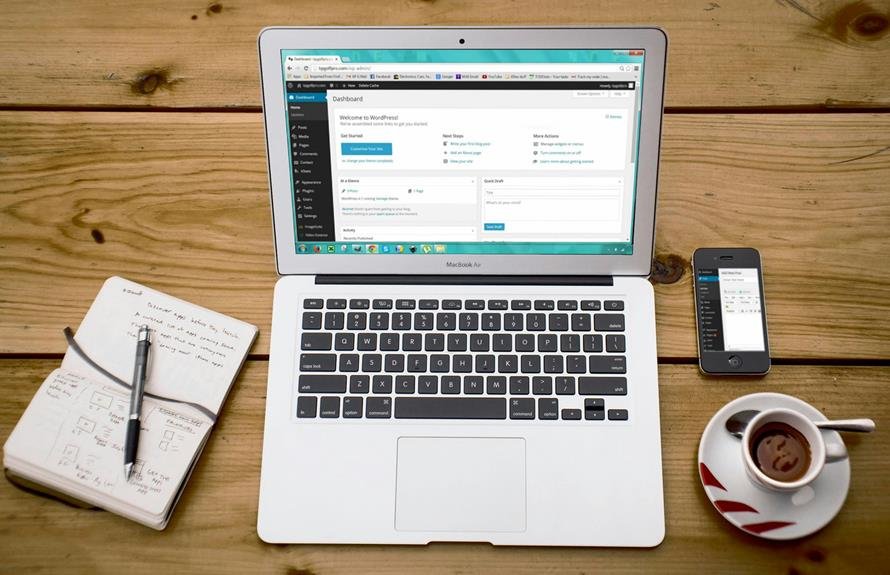Choosing the right CMS for your business needs starts with evaluating your specific goals and content strategy. You'll want to assess user experience, focusing on intuitive navigation and mobile responsiveness. Consider scalability to guarantee it grows with your business, and analyze your budget to understand total costs. Check integration capabilities for essential tools, prioritize security features, and explore customization options that align with your brand. Finally, investigate support resources available, such as community guidance and documentation. Each step is vital for selecting a CMS that enhances your online presence and supports your business objectives effectively. Discover more insights to make an informed choice!
Assess Your Business Requirements
When evaluating your business requirements, it's crucial to start by identifying your specific goals and objectives. Understanding your business goals will help shape your content strategy and guarantee that it aligns with your vision. Take the time to develop user personas, as they'll guide your approach to different content types and user roles.
Next, consider how your team collaboration can be streamlined through the right CMS. An effective platform should enhance communication among team members, enabling everyone to stay on the same page. Don't forget to keep an eye on industry trends; they can provide valuable insights that inform your choices and keep your content relevant.
Your technology stack also plays a critical role, as it must support the various tools and applications you plan to use. Establishing clear performance metrics will help you measure success and make necessary adjustments along the way. Finally, outline a project timeline to keep everyone accountable and guarantee timely delivery. By thoroughly evaluating these aspects, you'll be better equipped to choose a CMS that meets your business needs and sets you up for success.
Evaluate User Experience
How can you guarantee that your chosen CMS delivers an ideal user experience? Start by evaluating the user journey from the moment visitors land on your site. Is it intuitive and seamless? A well-designed interface can make all the difference. Look for a CMS that offers a clean, user-friendly dashboard, allowing you to manage content without frustration.
Next, consider how easily your audience can navigate your site. A logical structure and clear calls to action will help guide users towards their goals, whether that's making a purchase, signing up for a newsletter, or accessing important information. The interface design should prioritize usability, making certain that your audience can find what they need quickly.
Also, think about mobile responsiveness. Many users access websites via mobile devices, so your CMS must adapt to various screen sizes without compromising functionality. Test the CMS yourself to see how it feels; you'll want to verify it supports your objectives while providing a positive experience for your users.
Consider Scalability Options
As you consider the right CMS for your business, think about how it can grow alongside you. Evaluating its growth potential, future feature requirements, and integration capabilities is essential for long-term success. Choosing a scalable system now can save you time and headaches down the road as your needs evolve.
Growth Potential Assessment
Evaluating the growth potential of your chosen CMS is essential for guaranteeing long-term success. You want a platform that can evolve with your business, adapting to user feedback and shifting market trends. Here are three key factors to reflect on:
- Customization Options: A flexible CMS allows you to tailor features and tools as your needs change. This adaptability enables you to stay aligned with emerging market trends.
- User Capacity: As your business grows, your CMS should support an increasing number of users without sacrificing performance. Look for systems that can efficiently scale to accommodate this growth.
- Integration Capabilities: Your CMS should easily integrate with other tools and platforms. This guarantees you can incorporate new technologies and services as needed, keeping you competitive in a fast-paced market.
Future Feature Requirements
When selecting a CMS, it's important to take into account future feature requirements that support scalability. You want a system that not only meets your current needs but can also grow with your business. Think about what emerging technologies might become relevant in the coming years. For instance, features like artificial intelligence, enhanced analytics, or advanced personalization can set you apart as your business evolves.
It's vital to have a long-term vision in mind. Consider how your content needs might change over time. Will you need to support multilingual content? Or perhaps integrate new marketing channels? A scalable CMS should offer flexibility, allowing you to add features or modify existing ones without a complete overhaul.
Additionally, evaluate how easily the CMS can accommodate increased traffic or content volume. You don't want to be stuck with a platform that can't keep up during peak times or as your audience expands. Ultimately, choosing a CMS with robust scalability options guarantees that you're not just planning for today but also setting the stage for future growth. This proactive approach helps you stay competitive and ready for whatever comes next.
Integration Capabilities Evaluation
A scalable CMS not only needs to grow with your business but should also seamlessly integrate with other tools and platforms you rely on. Evaluating integration capabilities is vital for guaranteeing your CMS can handle future demands and enhance your operations. Here are three key areas to take into account:
- API Compatibility: Check if the CMS offers robust APIs that allow smooth communication between different systems. This guarantees your tools can work together effectively.
- Third Party Integrations: Look for a CMS that supports a variety of third-party integrations. This flexibility helps you connect with essential applications, enhancing your overall workflow.
- Plugin Ecosystem: A strong plugin ecosystem can greatly improve platform interoperability. It allows you to add functionalities as needed without overcomplicating your setup.
Analyze Budget Constraints
When you're choosing a CMS, it's crucial to analyze your budget constraints carefully. Consider not just the upfront costs, but also the total cost of ownership, which includes ongoing fees and potential hidden expenses. By understanding your financial limits, you can make a more informed decision that aligns with your business goals.
Total Cost of Ownership
Understanding the total cost of ownership (TCO) is essential for making informed decisions about your content management system (CMS). TCO goes beyond just the initial purchase price; it encompasses all costs associated with owning and operating the CMS over time. Here are three key factors to take into account:
- Licensing Models: Different CMS platforms have various licensing models, such as subscription-based or one-time purchases. Understanding these can impact your budget considerably.
- Maintenance and Support: Factor in ongoing costs for updates, technical support, and necessary training for your team. These expenses can accumulate over time, affecting your overall budget.
- Ownership Transfer: If you decide to switch CMS providers, think about how ownership transfer of your content and data will affect costs. Some platforms may charge fees for data migration or restrict access, making it essential to evaluate these aspects beforehand.
Hidden Expenses Consideration
Even with a clear grasp of the total cost of ownership, hidden expenses can catch you off guard. When selecting a Content Management System (CMS), it's vital to look beyond the initial price tag. You may find unexpected fees lurking in various aspects of CMS implementation and maintenance. For example, additional costs might arise from third-party integrations, custom development, or even training for your team.
You should also consider ongoing expenses such as hosting, security updates, and technical support. These hidden costs can quickly add up, impacting your overall budget. It's important to ask potential vendors about any extra charges that could come into play, as not all expenses are laid out upfront.
Moreover, take time to evaluate the scalability of the CMS. As your business grows, so might your need for additional features or user licenses, which could lead to increased costs down the line. By thoroughly investigating these hidden expenses, you can make a more informed decision and avoid unpleasant financial surprises. Always budget for the unexpected, and make sure that your chosen CMS aligns with your long-term financial strategy.
Review Integration Capabilities
A robust content management system (CMS) should seamlessly integrate with various tools and platforms that enhance your business operations. When considering integration capabilities, you need to focus on how well the CMS can work with your existing systems. Here are three key aspects to evaluate:
- Plugin Compatibility: Verify that the CMS supports popular plugins that your team relies on. This can include tools for SEO, social media, and analytics, which can greatly streamline your workflow.
- API Accessibility: Check if the CMS offers a robust API. This allows your developers to build custom integrations, making it easier to connect with other software and services your business uses.
- Third-Party Integrations: Look for built-in integrations with third-party applications. The more connections available, the easier it'll be to manage your content, track performance, and communicate with your audience.
Check Security Features
When it comes to choosing a CMS, security features should be at the forefront of your decision-making process. After all, your website holds sensitive information that needs protection. You'll want to verify the CMS you choose has robust security protocols in place, such as regular updates and patches to combat vulnerabilities.
One essential aspect is data encryption. This guarantees that any information transmitted between your website and your users remains confidential. A CMS that employs strong encryption methods will go a long way in safeguarding your business.
To help you evaluate different CMS options, here's a quick comparison of key security features:
| CMS Name | Security Protocols | Data Encryption |
|---|---|---|
| CMS A | Yes | AES-256 |
| CMS B | Yes | RSA-2048 |
| CMS C | No | None |
| CMS D | Yes | TLS 1.2 |
Explore Customization Flexibility
While you may have specific needs for your website, the level of customization a CMS offers can make or break your online presence. Customization flexibility is vital for creating a unique and engaging user experience. Here are three key aspects to take into account:
- Theme Customization: Look for a CMS that allows you to tweak your site's appearance easily. Whether it's changing colors, layouts, or fonts, a flexible theme customization feature helps you align your website with your brand identity.
- Plugin Availability: The availability of plugins can greatly enhance your website's functionality. A CMS with a rich library of plugins offers you the tools to add features like contact forms, SEO optimization, and social media integration without needing extensive coding knowledge.
- Responsive Design Options: Confirm the CMS supports responsive design, allowing your site to adapt to various devices. This is essential for providing a seamless experience for all users, regardless of how they access your site.
Investigate Support and Resources
Support and resources play an essential role in your CMS experience. When choosing a CMS, you need to investigate the level of community support available. A strong community can provide you with quick answers and solutions to common problems. Look for forums, chat groups, and social media communities where users share tips and experiences. This can be a lifesaver when you're facing a challenge and need guidance.
Additionally, consider the documentation quality that comes with the CMS. Well-structured, thorough documentation can make a significant difference in your learning curve. It should include tutorials, FAQs, and troubleshooting guides to help you navigate the platform effectively. If the documentation is lacking or hard to understand, you're likely to struggle as you implement the CMS for your business.
Don't overlook the importance of both community support and documentation quality. They can greatly enhance your experience and productivity. Investing time in this research now can save you headaches later, ensuring you have the resources you need to succeed with your chosen CMS. By prioritizing these aspects, you can make a more informed decision that aligns with your business needs.
Compare Popular CMS Solutions
After evaluating community support and documentation, it's time to compare popular CMS solutions to find the best fit for your business. Here's a quick look at three top contenders:
- WordPress: Known for its advantages like a user-friendly interface and vast plugin ecosystem, it's perfect for bloggers and small businesses alike.
- Shopify: If you're looking to sell online, Shopify's benefits include seamless e-commerce capabilities and secure payment options, making it ideal for retail businesses.
- Squarespace: With its stunning design templates, Squarespace offers simplicity and elegance, perfect for creatives wanting to showcase their portfolios.
Other notable options include Joomla, which provides extensive features for complex sites, and Drupal, celebrated for its flexibility and customization. If you need scalability, Magento is a solid choice for larger online stores, while Wix offers an easy-to-use platform for beginners. Finally, integration is a key selling point for HubSpot, making it great for marketing-focused sites. By comparing these solutions, you can determine which one aligns best with your specific needs and goals.
Conclusion
Choosing the right CMS for your business doesn't have to feel overwhelming. By carefully evaluating your needs and considering factors like user experience, scalability, and budget, you can find a solution that fits just right. Even if you think you're too small to need a sophisticated system, remember that the right CMS can grow with you and simplify your operations. So, take the time to explore your options—you'll be glad you did when your business thrives!





Leave a Reply